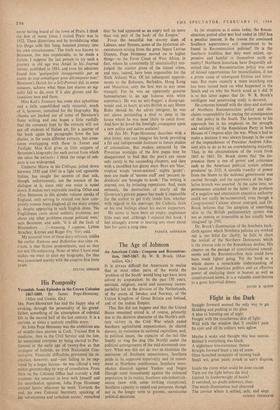His Pomposity
Verandah. Some Episodes in the Crown Colonies 1867-1889. By James Pope-Hennessy. (Allen and Unwin, 42s.)
MR. POPE-HENNESSY has had the happy idea of evoking, through the personality of his grand- father, something of the atmosphere of colonial life in the second half of the last century. It is a curious, at times a scarcely credible story.
Sir John Pope Hennessy was the ambitious son of middle-class parents in Cork. Trained first in medicine, then in the Civil Service and the law, he astonished everyone by being elected to Par- liament at the early age of twenty-five as that strangest of hybrids, an Irish Nationalist Con- servative. Financial difficulties prevented his re- election, however, and---just failing to be cap- tured by a bogus heiress—he was offered a very minor governorship by way of consolation. From then on the Colonial Office had scarcely a dull moment. An amateur in love with himself and his unorthodox opinions, John Pope Hennessy created havoc wherever he went. Towards the end, his own Colonial Secretary, speaking of his 'adventurous and turbulent career,' remarked that 'he had appeared as an angry boil on more than one part of the body of the Empire.'
From the beautiful but steamy slum of Labuan, near Borneo, scene of the hysterical cir- cumstances arising from the great Sepoy Latrine Dispute, Pope Hennessy moved on to higher things—to the Fever Coast of West Africa, in fact, where he consistently (if idealistically) mis- judged the sinister plans of the inland tribes, and may, indeed, have been responsible for the Sixth Ashanti War. Of his subsequent appoint- ments to the Bahamas, Barbados, Hong Kong and Mauritius, only the first was in any sense tranquil. For he was an apparently genuine humanitarian in an age hideous with white supremacy. He was an anti-flogger, a desegrega- tionist and, at heart, as anti-British as any Home Ruler should be. An adroit intriguer, he was not above persuading a rival to sleep in the house where he was most likely to catch fever. And how he loved the limelight consequent upon a new policy and native acclaim!
All this Mr. Pope-Hennessy describes with a nice irony; one can imagine his book providing a fat and indispensable footnote to future studies of colonialism. But readers attracted by the Proustian nostalgia of the first pages may be disappointed to find that the poet's eye opens only rarely in the succeeding chapters, and then with a dandified but glassy stare. Bays are 'blue,' tropical winds 'sweet-scented,' nights 'gauzy': men are made of 'sterner stuff' and 'peccant in- dividuals' are 'brought to book.' The writing is marred, too, by irritating repetitions. And, more seriously, the destruction of nearly all the Governor's private papers has made it impossible for the author to get truly inside him, whether with regard to his marriage, his Catholic faith or his real feelings about his native supporters.
He seems to have been an empty, unpleasant little 'man and, although I enjoyed this book, I feel strangely averse to hearing any more about him for quite a long time.
PATRICK ANDERSON






































 Previous page
Previous page